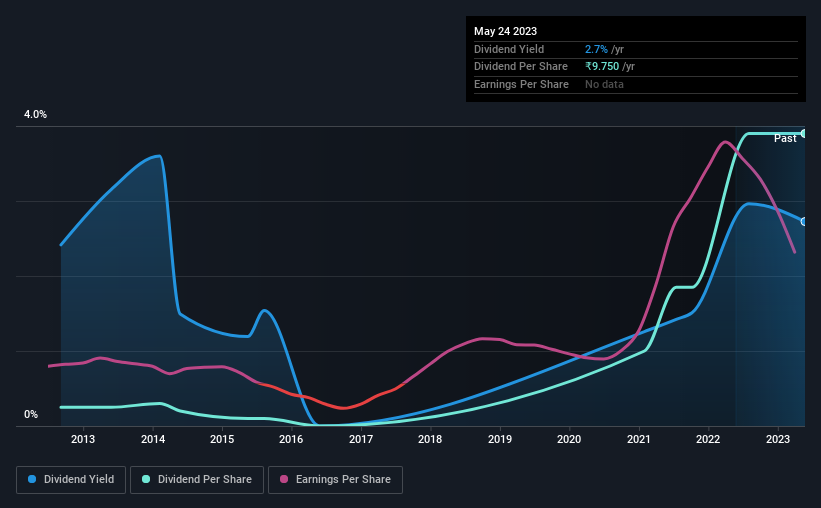- India
- /
- Metals and Mining
- /
- NSEI:GPIL
Godawari Power & Ispat's (NSE:GPIL) Dividend Will Be Reduced To ₹4.00
Godawari Power & Ispat Limited's (NSE:GPIL) dividend is being reduced from last year's payment covering the same period to ₹4.00 on the 16th of October. This payment takes the dividend yield to 2.7%, which only provides a modest boost to overall returns.
View our latest analysis for Godawari Power & Ispat
Godawari Power & Ispat's Payment Has Solid Earnings Coverage
If it is predictable over a long period, even low dividend yields can be attractive. Before making this announcement, Godawari Power & Ispat was easily earning enough to cover the dividend. This means that most of what the business earns is being used to help it grow.
The next year is set to see EPS grow by 6.3%. Assuming the dividend continues along recent trends, we think the payout ratio could be 7.8% by next year, which is in a pretty sustainable range.

Dividend Volatility
The company's dividend history has been marked by instability, with at least one cut in the last 10 years. The annual payment during the last 10 years was ₹0.625 in 2013, and the most recent fiscal year payment was ₹9.75. This means that it has been growing its distributions at 32% per annum over that time. Godawari Power & Ispat has grown distributions at a rapid rate despite cutting the dividend at least once in the past. Companies that cut once often cut again, so we would be cautious about buying this stock solely for the dividend income.
The Dividend Looks Likely To Grow
Given that the dividend has been cut in the past, we need to check if earnings are growing and if that might lead to stronger dividends in the future. We are encouraged to see that Godawari Power & Ispat has grown earnings per share at 32% per year over the past five years. A low payout ratio gives the company a lot of flexibility, and growing earnings also make it very easy for it to grow the dividend.
Godawari Power & Ispat Looks Like A Great Dividend Stock
It is generally not great to see the dividend being cut, but we don't think this should happen much if at all in the future given that Godawari Power & Ispat has the makings of a solid income stock moving forward. By reducing the dividend, pressure will be taken off the balance sheet, which could help the dividend to be consistent in the future. Taking this all into consideration, this looks like it could be a good dividend opportunity.
It's important to note that companies having a consistent dividend policy will generate greater investor confidence than those having an erratic one. At the same time, there are other factors our readers should be conscious of before pouring capital into a stock. As an example, we've identified 2 warning signs for Godawari Power & Ispat that you should be aware of before investing. If you are a dividend investor, you might also want to look at our curated list of high yield dividend stocks.
New: Manage All Your Stock Portfolios in One Place
We've created the ultimate portfolio companion for stock investors, and it's free.
• Connect an unlimited number of Portfolios and see your total in one currency
• Be alerted to new Warning Signs or Risks via email or mobile
• Track the Fair Value of your stocks
Have feedback on this article? Concerned about the content? Get in touch with us directly. Alternatively, email editorial-team (at) simplywallst.com.
This article by Simply Wall St is general in nature. We provide commentary based on historical data and analyst forecasts only using an unbiased methodology and our articles are not intended to be financial advice. It does not constitute a recommendation to buy or sell any stock, and does not take account of your objectives, or your financial situation. We aim to bring you long-term focused analysis driven by fundamental data. Note that our analysis may not factor in the latest price-sensitive company announcements or qualitative material. Simply Wall St has no position in any stocks mentioned.
About NSEI:GPIL
Flawless balance sheet with reasonable growth potential and pays a dividend.
Similar Companies
Market Insights
Community Narratives



